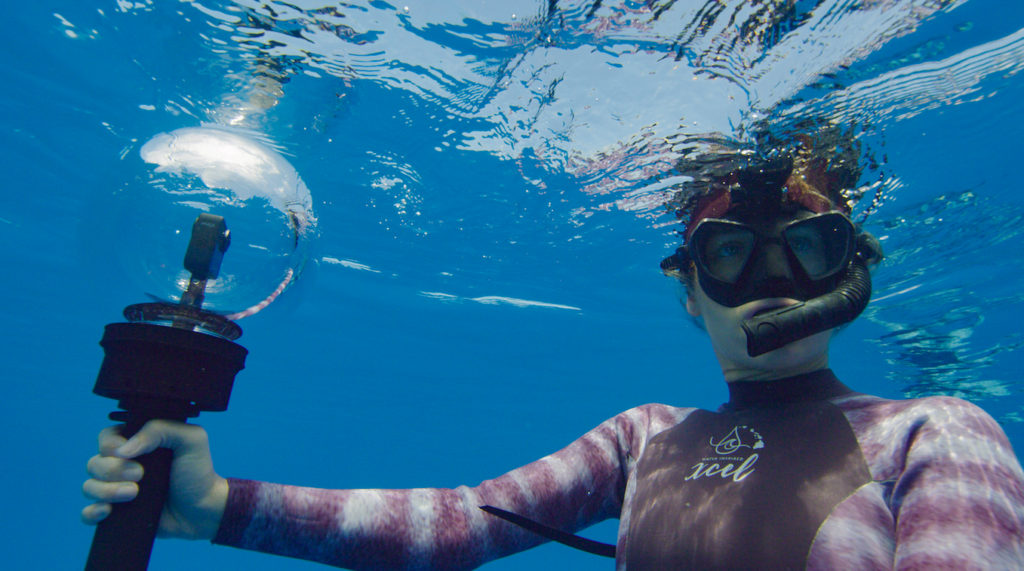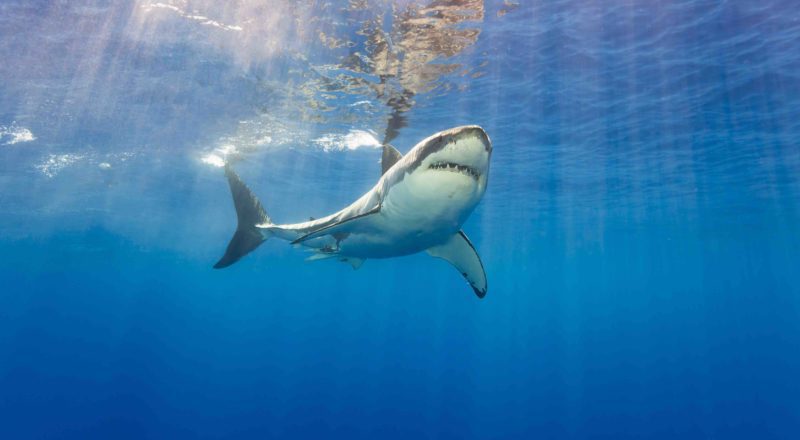INTERVIEW: Sharkfest experts remember when they first fell in love with the ocean
Photo: A great white shark (Carcharodon carcharias) off the coast of Guadalupe Island, Mexico. Photo courtesy of Nat Geo Wild / Provided with permission.
Sharkfest, the annual shark-tastic programming from Nat Geo and Nat Geo WILD, is winding down its coverage this summer. Fans of the networks’ seal-chomping documentaries have gotten to know many of the experts on the various TV specials, including four women who have each been heavily influenced by the oceans and marine life.
Frances Farabaugh, featured this year on Sharks vs. Dolphins: Blood Battle, is a marine ecologist, while Kimberly Jeffries, featured on Most Wanted Sharks, is a photographer and diver, someone who has actually swam with great white sharks, including what’s believed to be the largest specimen ever tracked. Dr. Rhianna M. Neely-Murphy is the head of the Climate Change Unit at the Ministry of the Environment in the Bahamas, and this year she is featured on When Sharks Attack. Finally, there’s Kori Garza, a marine biologist and tiger shark expert who can be seen on World’s Biggest Tiger Shark?
Recently these marine experts came together for a phone call with journalists, and Hollywood Soapbox was able to talk with them about the time when they first fell in love with the ocean and sharks. Here’s what they had to say …
GARZA: “For me, I didn’t grow up near the ocean. I’m actually from St. Louis, Missouri, so the infatuation was kind of skewed. It was more Jaws the movie actually that got me into the shark world when I was maybe about 5 years old, so not quite the traditional route, but it was an obsession from there. My only exposure was National Geographic documentaries. Steve Irwin, the Crocodile Hunter, was a huge influence, and then once I got a little bit older is when I finally actually saw the ocean for the first time. And it just kind of confirmed it from there.”
JEFFRIES: “Similar to Kori, I grew up in a city environment far away from the ocean, but as a result of diving here in Hawaii and getting to experience the ocean first-hand, I kind of fell in love with all aspects of the ocean. And then through various participation with different scientific communities and organizations I began to realize that sharks are in dire need of protection and more attention, and I really became fascinated with how special they are for the ocean. So I kind of fell in love with them more and more over the years, much more recently — a lot of love for them.”
FARABAUGH: “Like the other women, I was fascinated by nature and by the oceans from a very young age, partially through exposure to things like National Geographic, Animal Planet documentaries, the Kratt brothers when I was really little, but there were a couple moments that solidified my interests and my passion. I think one of them when I was quite young before I lived here on the coast, I was living landlocked in Texas, and my parents took me to an aquarium where they had a ‘swim with the sharks’ experience. And I remember getting in the water and feeling slightly uncomfortable because the salt water tasted funny, and it stung my eyes. And I hadn’t been exposed to that much before, and then I remember opening my eyes and just being in awe of these beautiful predators that were swimming around me, these beautiful animals. And my mother attests that it was nearly impossible to get me out of the water after that, and … from exploring tide pools and being able to get in the ocean more often, I’ve been hooked ever since.”
NEELY-MURPHY: “I think I may be the outlier here. I have grown up on an island. Nassau is 21 miles by 7 miles, so the ocean has always been there. But it’s always been sort of as background noise. Growing up, I didn’t really go to the beach, mainly on holidays, but you drive past it all the time. But in my family and in my circle of friends, the ocean was really something that was revered and feared because you have to be very careful when entering into the ocean. Sometimes we associate it with drowning and things like that, but my interest in the ocean actually came from hurricanes and storms because, like I said, you drive past this ocean, the beach every day, and it’s usually very calm. And when you have storms during hurricane season, that same water that is usually very calm and relaxing to you, you hear the waves lapping up on the shoreline, it’s the very same water that is destructive to houses and homes and livelihoods and our infrastructure and causes you to have storm surges and power outages and all of these kinds other things.
“So the ocean was really something that was definitely a magnificent being, but it was more or less something to be revered and feared. And then as I got older, I realized that this being needed to be protected. The more I went to school, and you go to primary school and high school, and you realize the stresses that it can be under from some of the things that we do on land and some of the external factors. So my interest in the ocean really started off with how do you turn from being this calm and relaxing background noise to this dangerous destroyer of land and houses, so that’s my attraction to the ocean.”
By John Soltes / Publisher / John@HollywoodSoapbox.com
Sharkfest continues on Nat Geo WILD through Friday, Aug. 21. Click here for more information.


